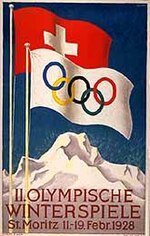1928 Winter Olympic Games
 |
|||
| Host city | St. Moritz, Switzerland | ||
|---|---|---|---|
| Nations participating | 25 | ||
| Athletes participating | 464 (438 men, 26 women) |
||
| Events | 14 in 4 sports (8 disciplines) | ||
| Opening ceremony | February 11 | ||
| Closing ceremony | February 19 | ||
| Officially opened by | President Edmund Schulthess | ||
| Athlete's Oath | Hans Eidenbenz | ||
| Stadium | St. Moritz Olympic Ice Rink | ||
| Winter: | |||
|
|||
| Summer: | |||
|
|||
The 1928 Winter Olympics, officially known as the II Olympic Winter Games (French: Les IIes Jeux olympiques d'hiver) (German: Olympische Winterspiele 1928) (Italian: II Giochi olimpici invernali) (Romansch: Gieus olimpics d'enviern 1928), were a winter multi-sport event which was celebrated February 11–19, 1928 in St. Moritz, Switzerland. The 1928 Games were the first true Winter Olympics held on its own as they were not in conjunction with a Summer Olympics. The preceding 1924 Games were retroactively renamed the inaugural Winter Olympics, though they had been in fact part of the 1924 Summer Olympics. All preceding Winter Events of the Olympic Games were the winter sports part of the schedule of the Summer Games, and not held as a separate Winter Games. These games also replaced the now redundant Nordic Games, that were held quadrennially since early in the century.
Medals were awarded in 14 events contested in 4 sports (8 disciplines).
Athletes from 25 nations competed at these Games, up from 16 in 1924. Nations making their first appearance at the Winter Olympic Games were Argentina (first participation of a delegation coming from a country belonging to the Southern Hemisphere), Estonia, Germany, Japan, Lithuania, Luxembourg, Mexico, the Netherlands, and Romania.
...
Wikipedia
